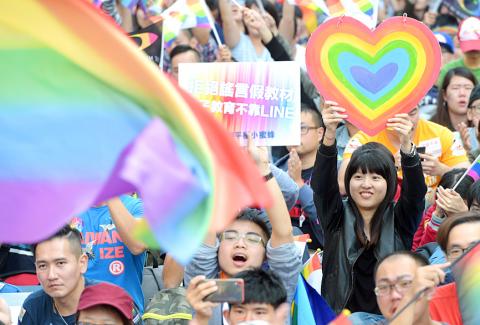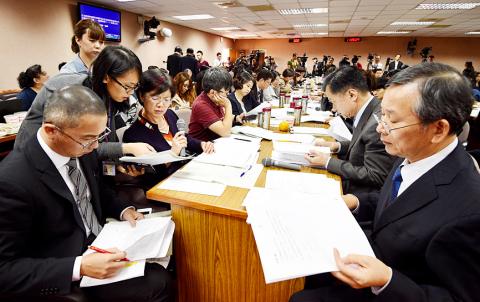Amid heated protests, amendments to the Civil Code to recognize same-sex marriage cleared a legislative committee yesterday, bringing the nation one step closer to legalizing same-sex marriage.
The legislature’s Judiciary and Organic Laws and Statutes Committee passed draft amendments to the Civil Code which would legalize same-sex marriage and entitle same-sex couples to the same marital, parental and adoptive rights and obligations accorded to heterosexual couples by the Civil Code and other laws, with the exception of the presumption of paternity, a legal determination that is still exclusively for heterosexual couples.
During the review, the committee revised an amendment proposed by Democratic Progressive Party (DPP) Legislator Yu Mei-nu (尤美女) that would neutralize the gender-based Article 972 of the Civil Code, which stipulates that a marriage is an agreement between a man and a woman.

Photo: Chang Chia-ming, Taipei Times
Yu’s amendment would remove the “man and woman” provision from the article and recognize marriage as an agreement between “two parties,” a contentious point between supporters and opponents of the marriage equality legislation.
However, to reduce opposition to the legislation, DPP Legislator Julian Kuo (郭正亮) raised a motion to revise Yu’s amendment, proposing that “man and woman” be retained, but inserting an addendum to recognize “both parties of a same-sex marriage.”
Chinese Nationalist Party (KMT) Legislator Hsu Shu-hua (許淑華) raised a similar motion.

Photo: Peter Lo, Taipei Times
Kuo’s motion was passed.
An amendment to the adoption regulations of the Civil Code would introduce an anti-discrimination provision to prohibit the courts from rejecting adoption applications based on gender, gender identification or sexual orientation.
The amendments, as well as other draft bills on marriage equality, are to be deliberated in cross-caucus negotiations before further reviews. The next legislative review is not expected until April.
“It is an act of democracy that the amendments were passed after communication and deliberations,” Yu said.
She called on the public not to spread misinformation about the amendments, as, unlike opponents of the legislation have said, the amendments would not remove the legal terms “father” and “mother” or “husband” and “wife.”
“The public can rest assured that the legislation will not change heterosexual marriage in any way, but it will extend [the rights and obligations of] such marriages to same-sex couples,” she said. “The legislation will not destroy the family or abolish marriage.”
The legalization of same-sex marriage does not cause civic unrest in the Netherlands, which was the first country to legalize same-sex marriage, Yu said, urging marriage equality opponents to exercise tolerance.
She rejected proposals to launch a referendum to decide on marriage equality, saying a human rights issue should not be put to the vote.
“We are not God. How do we have the right to decide on other people’s human rights?” Yu asked.
It would take at least six months for the legislation to pass, she said, calling on lesbian, gay, bisexual and transgender rights campaigners to make use of those “golden six months” to communicate with the public.
Minister of Justice Chiu Tai-san (邱太三) said the Ministry of Justice would propose a special same-sex marriage law by February, which is expected to undergo review in the next legislative session along with the amendments to the Civil Code passed yesterday.
The committee had asked the ministry to propose legal solutions on the issue of marriage equality, and the ministry could finalize a draft bill by February, Chiu said.

Intelligence agents have recorded 510,000 instances of “controversial information” being spread online by the Chinese Communist Party (CCP) so far this year, the National Security Bureau (NSB) said in a report yesterday, as it warned of artificial intelligence (AI) being employed to generate destabilizing misinformation. The bureau submitted a written report to the Legislative Yuan in preparation for National Security Bureau Director-General Tsai Ming-yen’s (蔡明彥) appearance before the Foreign Affairs and National Defense Committee today. The CCP has been using cognitive warfare to divide Taiwanese society by commenting on controversial issues such as Taiwan Semiconductor Manufacturing Co’s (TSMC, 台積電) investments in the

INVESTIGATION: The case is the latest instance of a DPP figure being implicated in an espionage network accused of allegedly leaking information to Chinese intelligence Democratic Progressive Party (DPP) member Ho Jen-chieh (何仁傑) was detained and held incommunicado yesterday on suspicion of spying for China during his tenure as assistant to then-minister of foreign affairs Joseph Wu (吳釗燮). The Taipei District Prosecutors’ Office said Ho was implicated during its investigation into alleged spying activities by former Presidential Office consultant Wu Shang-yu (吳尚雨). Prosecutors said there is reason to believe Ho breached the National Security Act (國家安全法) by leaking classified Ministry of Foreign Affairs information to Chinese intelligence. Following interrogation, prosecutors petitioned the Taipei District Court to detain Ho, citing concerns over potential collusion or tampering of evidence. The

‘COMPREHENSIVE PLAN’: Lin Chia-lung said that the government was ready to talk about a variety of issues, including investment in and purchases from the US The National Stabilization Fund (NSF) yesterday announced that it would step in to staunch stock market losses for the ninth time in the nation’s history. An NSF board meeting, originally scheduled for Monday next week, was moved to yesterday after stocks plummeted in the wake of US President Donald Trump’s announcement of 32 percent tariffs on Taiwan on Wednesday last week. Board members voted to support the stock market with the NT$500 billion (US$15.15 billion) fund, with injections of funds to begin as soon as today. The NSF in 2000 injected NT$120 billion to stabilize stocks, the most ever. The lowest amount it

NEGOTIATIONS: Taiwan has good relations with Washington and the outlook for the negotiations looks promising, Minister of Economic Affairs J.W. Kuo said Taiwan’s GDP growth this year is expected to decrease by 0.43 to 1.61 percentage points due to the effects of US tariffs, National Development Council (NDC) Minister Paul Liu (劉鏡清) said at a meeting of the legislature’s Economics Committee in Taipei yesterday, citing a preliminary estimate by a private research institution. Taiwan’s economy would be significantly affected by the 32 percent “reciprocal” tariffs slapped by the US, which took effect yesterday, Liu said, adding that GDP growth could fall below 3 percent and potentially even dip below 2 percent to 1.53 percent this year. The council has commissioned another institution